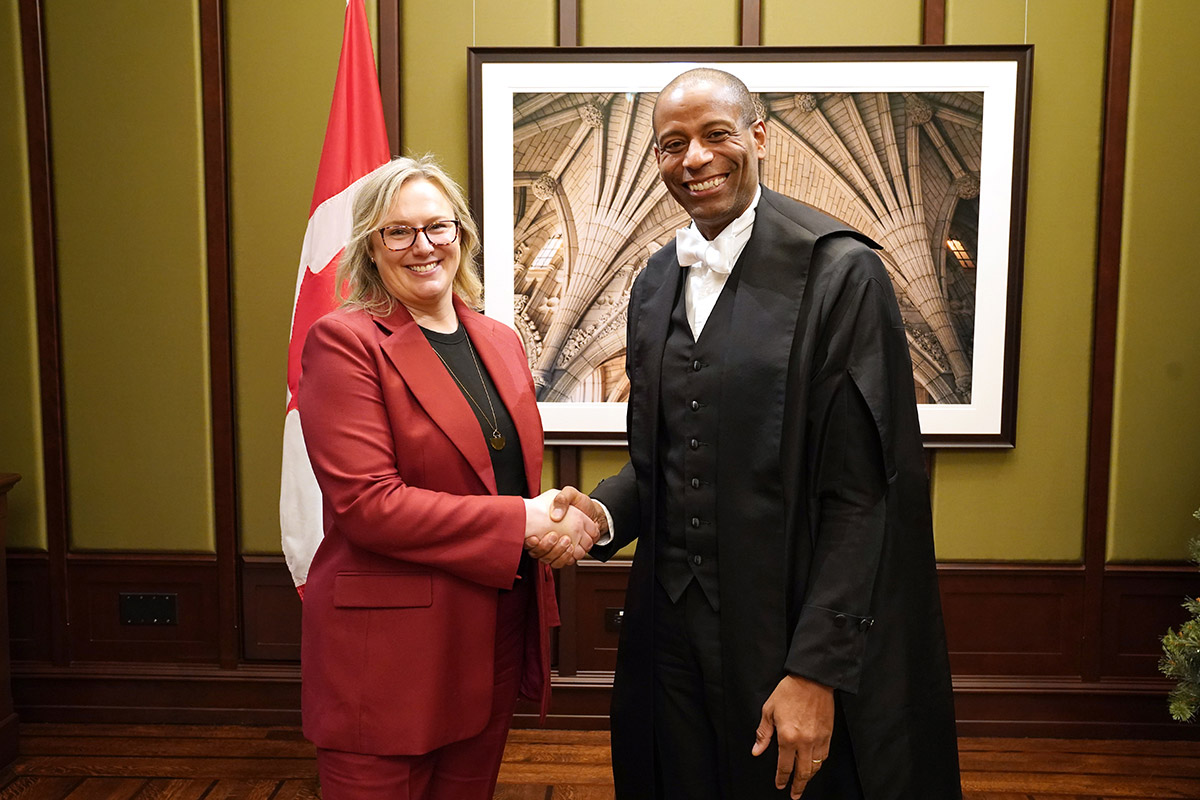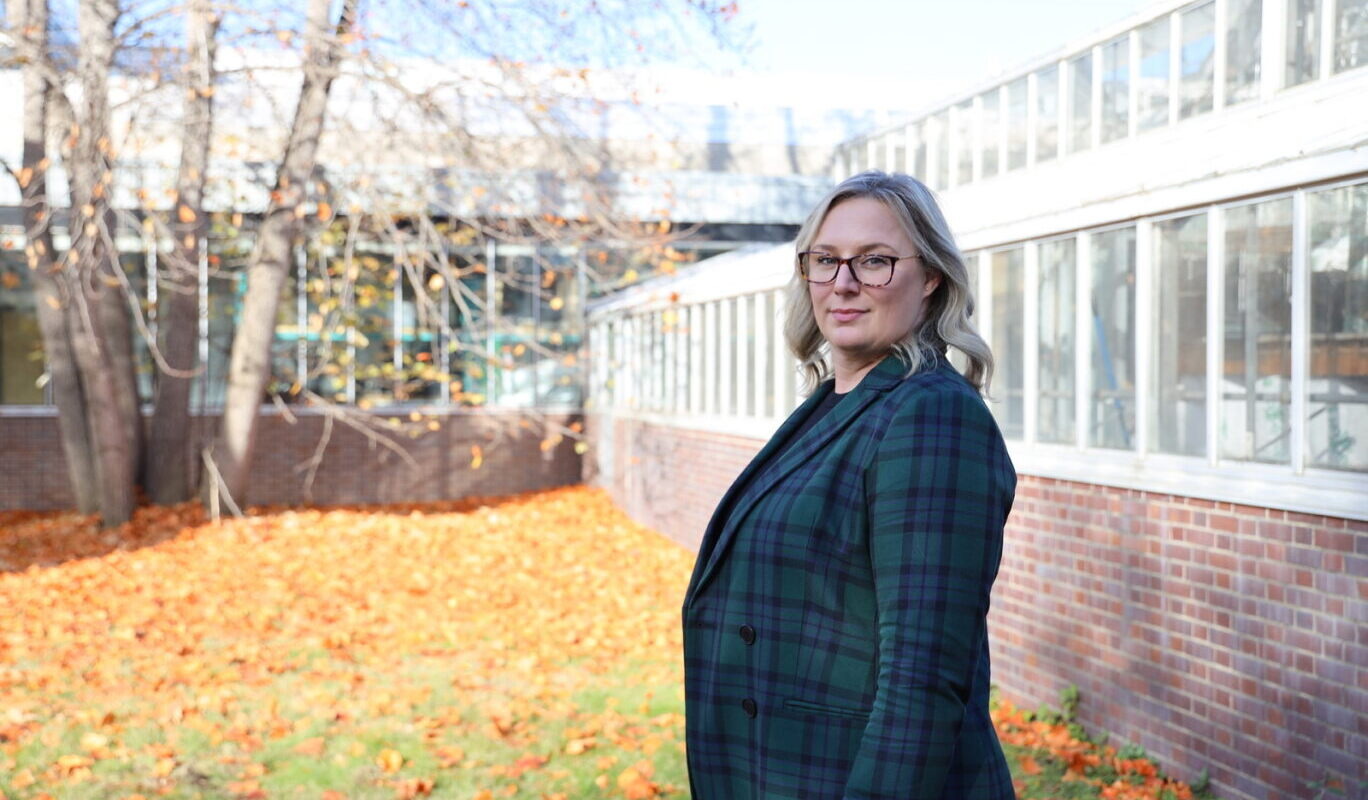By Elizabeth Kane
Photos by Brenna Mackay
Amid ongoing global conflicts, national security and combating terrorism are on the minds of many. As nations try to cut off terrorist organizations from their funding sources, how can governments be sure their strategies are effective while also safeguarding civilians? Carleton University PhD candidate Jessica Davis’s research in counterterrorism, intelligence and Canadian national security, is providing those answers.
Terrorist groups often acquire funds through various illicit activities and by targeting legitimate organizations. Different countries employ various strategies such as financing legislation, policies and practices, to counteract the financing of terrorism. Davis’s research through Carleton’s Norman Paterson School of International Affairs (NPSIA) is unpacking which of those strategies are effective and why.

Carleton University PhD candidate Jessica Davis
In recognition of this vital, ongoing research, Davis was announced as the recipient of the prestigious Social Sciences and Humanities Research Council (SSHRC) Talent Impact Award. Given to one person each year, it is considered one of Canada’s top honours for social sciences and humanities researchers.
Continue reading to learn more about Davis’s research.

Money: The Enabling Factor
Illicit financing in all its forms is a matter of great concern to governments as they address the drivers of violence.
“If it’s criminal activity, money is the motivating factor, and if it’s terrorist activity, money is the enabling factor,” says Davis.
“You can’t conduct a big terrorist attack without much money.”
Anti-terrorist financing measures can have significant and far-reaching unintended consequences for the human rights of civilian populations.

The Honourable Greg Fergus, Speaker of the House of Commons congratulating Jessica Davis for winning 2023 Social Sciences and Humanities Research Council (SSHRC) Impact Awards in the Talent category (Photo courtesy of SSHRC)
“It’s very easy to look at charities, particularly those that are operating in conflict zones, which are often the parts of the world that need help the most as they are being abused by terrorist groups,” says Davis.
Terrorists may tax or extort aid organizations, so countries have historically taken aim at these non-profit groups in their anti-terrorist financing policies.
“But what ends up happening is that when you target that aid and some of those charitable activities that are ongoing, you really punish the civilian population where the terrorist groups are operating in a way that’s quite disproportionate and maybe not all that effective from stopping the terrorist group in general,” says Davis.

The Reality of Ransom Payments
Another avenue that terrorist organizations will use to raise funds is taking hostages for ransom, a topic that Davis and Carleton Prof. Alex Wilner have examined. Conventional wisdom states that paying a ransom provides funding to a terrorist group that will result in more terrorist activity and encourage more kidnappings for ransom.
“The research we conducted doesn’t find a direct correlation there,” she says. “It really opens the conversation and challenges that conventional wisdom about whether or not we should be paying ransoms or how we should be trying to free our citizens that get kidnapped by terrorist groups.
“The evidence just doesn’t support an absolute moratorium on that.”

Critical Role of Research-Informed Policy
In addition to leading her own intelligence consulting company, Davis is a senior visiting fellow with The Soufan Centre, a senior associate with the Centre for Strategic and International Studies and is an associate fellow with the Royal United Services Institute Center for Financial Crime and Security Studies – one of the world’s leading think tanks on illicit financing issues.
Davis also serves as the president of the Canadian Association for Security and Intelligence Studies – pushing forward the study of these topics and encouraging students and researchers to get involved.
As the financing operations of terrorist organizations continue to evolve, further research in this field is essential.
“I want to bring that research to the policy world,” she says. “To make sure that international organizations that set standards for counter-terrorist financing – like the Financial Action Task Force or the United Nations – understand this research and make effective recommendations to governments on counter-terrorist financing and reduce unintended consequences of these policies.”

About SSHRC Impact Awards
The SSHRC Impact Awards celebrate the achievements of Canada’s top leaders, thinkers and researchers in the social sciences and humanities. Finalists embody the best ideas and research about people, human thought and behaviour, and culture—helping us understand and improve the world around us, today and into the future.
Thursday, November 23, 2023 in Faculty of Public and Global Affairs, IWD 2024
Share: Twitter, Facebook


